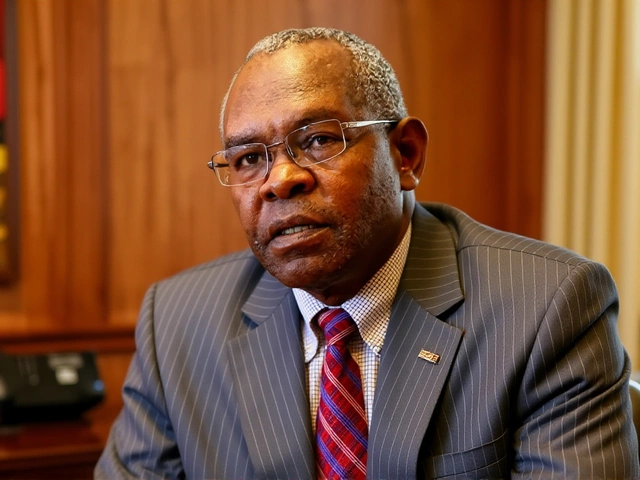Kenya's Financial Crisis Deepens as Government Considers Additional Borrowing
Kenya is at a critical crossroads as President William Ruto announces the government’s need to borrow an additional one trillion Kenyan shillings (approx. $6 billion or £6.1 billion). This necessity comes on the heels of the rejection of a highly contentious finance bill. Initially aimed at alleviating the nation’s substantial debt, the bill proposed tax hikes which were met with widespread disapproval, culminating in violent protests and the arson of the parliament building.
The withdrawal of the bill highlights the precarious financial position Kenya finds itself in. With a debt load exceeding $80 billion (£63 billion), the country’s fiscal health is deteriorating rapidly. President Ruto expressed his regret over the setbacks caused by abandoning the bill, recognizing the delicate balance needed to raise additional tax revenue while the country grapples with such significant financial obligations.
The rejected finance bill proposed tax increases intended to generate approximately 350 billion Kenyan shillings to address Kenya’s staggering debt. A significant portion of this revenue was earmarked for debt servicing, which is crucial given the current financial obligations. However, the violent reaction to the bill’s proposals and subsequent withdrawal have left Kenya with few options but to consider further borrowing. This move is seen as essential to maintain basic operations and public services.
Impact on Public Services
The consequences of the bill’s rejection are far-reaching. The employment of temporary junior secondary school teachers is under threat, and healthcare services are similarly at risk. Furthermore, sectors crucial to Kenya’s economy, such as agriculture—especially those involved in dairy, sugarcane, and coffee production—may face reduced support due to financial constraints.
In an effort to manage the fiscal shortfall, President Ruto has signaled potential budget cuts across various governmental departments, including his own office, the judiciary, and county administrations. These austerity measures, while necessary, are likely to exacerbate the financial strain on a populace already dealing with economic hardships.
Civil Unrest and Government Accountability
Discontent among Kenya’s citizens shows no signs of abating. The violent protests following the proposed finance bill have set a precedent for ongoing demonstrations. Many citizens demand greater government accountability and transparency, with some groups calling for President Ruto’s resignation. Criticisms are particularly pointed regarding the perceived insensitivity of the government to the populace’s struggles, as well as allegations of excessive use of force by law enforcement during the protests, which resulted in casualties.
President Ruto has acknowledged the grievances, emphasizing the importance of addressing the concerns raised by the citizens. He has assured the public that any excesses by law enforcement will be thoroughly investigated and accountability enforced. Nonetheless, the nation remains on edge, with a wary populace and an uncertain economic future.

Kenya’s Path Forward
As Kenya navigates this tumultuous period, the path forward is fraught with challenges. The necessity to borrow an additional trillion shillings underscores the serious nature of the country's fiscal predicament. With the rejection of the finance bill, the government must explore alternative means of generating revenue without inciting further public outrage. Innovative fiscal strategies and perhaps more palatable measures will be essential to stabilize the economy.
Moreover, fostering an environment of trust and dialogue between the government and its citizens will be crucial. Transparent communication and genuine efforts to mitigate the economic strain on the populace may help alleviate some of the unrest. Ultimately, Kenya's ability to weather this financial storm will depend on both prudent economic policies and the cohesion of its society.
In conclusion, the rejection of the finance bill marks a significant juncture in Kenya's economic narrative. The government's resolve will be tested as it seeks to balance fiscal responsibility with social stability. The coming months will be critical, with the potential for either recovery or further decline hinging on how effectively these challenges are managed.





Comments
The specter of debt looms like a thundercloud over Nairobi-dark, relentless, and striking with every missed payment!!! The finance bill’s collapse has turned hope into a bitter cold wind that rattles every corridor of power!!! Yet, amidst the chaos, there remains a flicker of resolve-like a lone candle fighting the gale!!!
The recent developments surrounding Kenya's fiscal policy merit a comprehensive examination that extends beyond the immediate headlines.
First, the abandonment of the proposed finance bill represents a significant deviation from the conventional mechanisms through which sovereign states address burgeoning public debt.
Such legislative setbacks inevitably amplify the fiscal gap, compelling the executive branch to explore alternative financing avenues, including external borrowing.
While borrowing an additional one trillion Kenyan shillings may provide short‑term liquidity, it also raises concerns regarding debt sustainability metrics that have already approached critical thresholds.
International credit rating agencies typically assess debt‑to‑GDP ratios, and Kenya's current trajectory suggests a potential downgrading that could exacerbate borrowing costs.
Moreover, the underlying structural deficits-particularly in revenue mobilization-remain insufficiently addressed by ad‑hoc fiscal measures.
The rejected tax increase component, projected to generate 350 billion shillings, would have contributed to debt service obligations and modestly improved the fiscal balance.
Its removal not only diminishes expected inflows but also signals a disconnect between policy formulation and public acceptance.
In this context, the government would benefit from a transparent dialogue with stakeholders to calibrate tax reforms that are both equitable and politically feasible.
Such a consultative approach could mitigate the risk of civil unrest, which has already manifested in violent protests and the alarming arson incident at the parliament building.
Furthermore, any incremental borrowing should be accompanied by a rigorous macro‑economic framework that outlines clear repayment schedules and contingency plans.
Adopting a prudent mix of domestic resource mobilization, expenditure rationalization, and targeted borrowing can preserve macro‑economic stability.
From a governance perspective, strengthening institutional capacity within the Ministry of Finance to implement and monitor these measures is paramount.
Equally important is fostering public trust through regular reporting and accountability mechanisms that address allegations of excessive force and corruption.
In sum, Kenya stands at a crossroads where decisive, well‑communicated policy actions can either restore fiscal credibility or plunge the economy deeper into uncertainty.
Policymakers must therefore weigh immediate fiscal relief against long‑term sustainability to chart a viable path forward.
We must act now, or the debt will drown us.
The government could explore concessional loans from multilateral institutions, which often carry lower interest rates and longer maturities.
Additionally, restructuring existing debt with private creditors may free up fiscal space.
A phased approach to tax reforms, focusing on broad‑based consumption taxes, could also generate stable revenue without provoking mass protests.
i think the gov'ment needs to step up and talk 2 the peeps, not just throw shillings at the problem!!! its real messy out here, lol.
This is a pathetic display of fiscal incompetence; borrowing more money while cutting services is pure madness.
Debt is a shadow that follows prosperity; only prudent stewardship can keep it from eclipsing growth.
Great job, guys 🙄💸
Stay hopeful 😊 keep pushing forward 🚀
Your observation about the need for genuine dialogue resonates deeply with the broader discourse on governance.
When leaders prioritize transparent communication over opaque fiscal maneuvers, public confidence can be restored incrementally.
It is essential, however, to balance emotive appeals with concrete policy frameworks that delineate how additional resources will be allocated.
For instance, earmarking borrowed funds for critical sectors such as health and education, while simultaneously instituting anti‑corruption safeguards, could alleviate some of the citizenry's anxieties.
Moreover, engaging civil society organizations in the budgeting process can provide a channel for grievances to be heard constructively.
Such inclusive mechanisms not only mitigate unrest but also enhance the legitimacy of fiscal decisions.
In conclusion, coupling open dialogue with accountable financial planning may constitute the most viable route out of the current impasse.